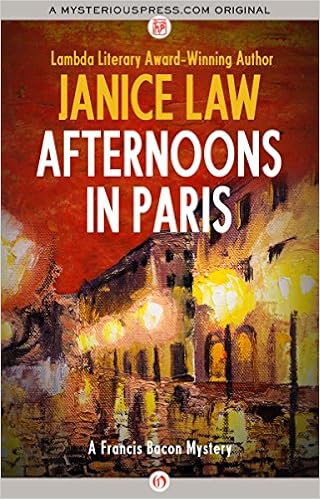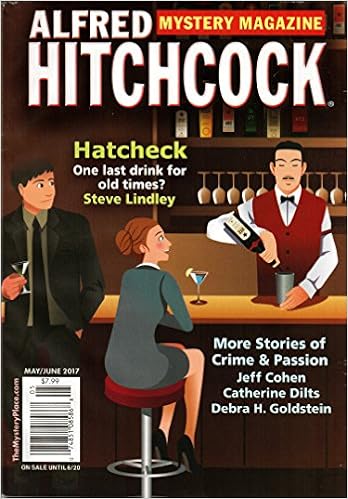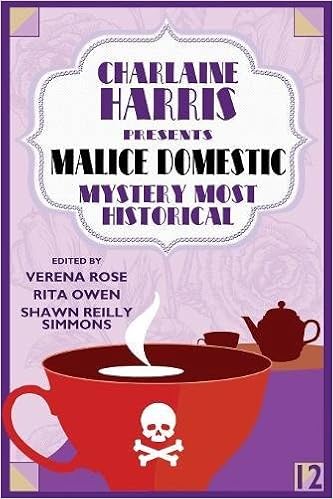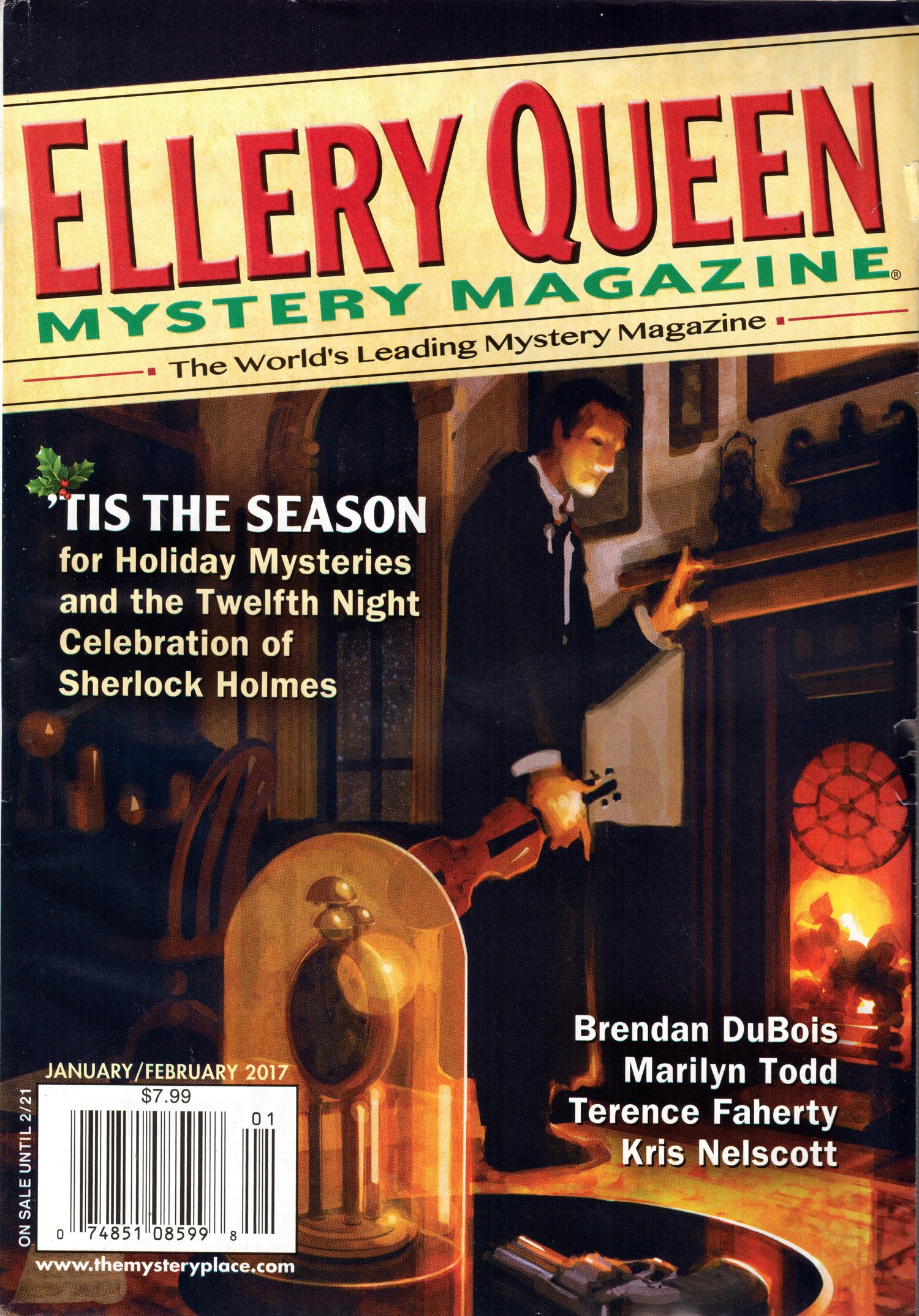 by Robert Lopresti
by Robert Lopresti
Once again awards time has come around, and I am prepared to list the best short mystery stories of the year. This is my
ninth annual wingding and either I am going soft or 2017 was a particularly good year for the field. You will find 18 stories listed below, up five from last year, and one ahead of my previous record. What can I say? May be this was just a year that needed distractions.
The big winners were
Ellery Queen Mystery Magazine, and
Alfred Hitchcock Mystery Magazine, tied with five stories each. Akashic Press and
Mystery Weekly Magazine each scored two.
Four of the authors were women; fifteen were men. Four authors are appearing for the second time on this august list. Two completed the hat trick. More remarkably, one author scored two on the list this year. The only other time that happened it was achieved by Brendan Dubois in
2012.
Six of the stories are funny (says me); four have fantasy elements. Only one is a historical. I think one could be described as fair play.
Enough chatter, let's go down to the red carpet.
Blakey, James. "Do Not Pass Go," in Mystery Weekly Magazine, September 2017.
The
narrator has just arrived in a town and quickly discovers that the cops
are corrupt, the wealthy run things to suit themselves, and the
employers rip off the workers. Just like thousands of other crime stories.
But he gets a job at the Water Works where people get paid in brightly
colored scrip. He doesn't earn enough to rent one of the identical
houses on New York or Kentucky Avenues. He almost gets sent to jail for
not paying the poor tax. And the Parker Brothers run everything. It's like they've got a – What's that word again?
Cohen, Jeff. "It's a Mad, Mad, Mad, Mad Girl!" in Alfred Hitchcock's Mystery Magazine, May/June 2017.
Elliot
runs a movie theatre that shows nothing but comedies, most of them
old. That may explain why Sharon, a doctor, divorced him years ago.
Harder to explain is that she's about to have Elliot's baby. Like today.
Elliot rushes her to the hospital and promptly bumbles into a supply closet
where a man in scrubs seems to be in the act of killing a woman in
scrubs with a knife. Awkward. Cohen writes funny.
Coward, Mat. "What Could Possibly Go Boing?" in Ellery Queen's Mystery Magazine, July/August 2017.
Meet the staff of Fake Dog Dirt Etc, a rather low-end novelty shop. One of them just killed their
boss, almost accidentally.
They hope to keep the dump open for a few
more paychecks, if they can hide the body. And find the boss's hidden
money. And avoid the cops. Did I mention the blackmailer?
Deaver, Jeffery. "Hard to Get," in Ellery Queen's Mystery Magazine, July/August 2017.
Deaver is making his
second
appearance in my annual best of list. And by the way, something very
unusual happened here: the Edgar judges and I agree on this one. It is a
very surprising thing when one of my favorites gets nominated.
Lessing is an
analyst for the CIA; a desk jockey. When an agent dies while preparing for a vital mission, Lessing is the only person
with the knowledge to fill the gap.
So all of a sudden he is in a small town in Poland trying to attract the
attention of the deputy to the Russian spymaster who is running a ring
of seditionists in the United States. But he has to attract the man
subtly. If he is too obvious they will know it's a trap. Play hard to
get, he is told...
Deaver, Jeffery. "A Significant Find," in Alive in Shape and Color, edited by Lawrence Block, Pegasus Books, 2017.
And here is Deaver again, with his second appearance in my Best of 2017. Greedy, greedy.
Roger and Della are having a
crisis of conscience. They are a married couple, both moderately
successful mid-career archaeologists, and they are in France for a
conference. Why the crisis? Well, let's put it this
way. Suppose Professor A gets a clue to a career-changing discovery but
doesn't realize how to use it. If he tells Professors B and C about it
and they are more clever at interpreting the puzzle, are B and C
required to share the credit with A? An ethical dilemma
indeed. Worse dilemmas will follow.
 Gates, David Edgerley. "Cabin Fever," in Alfred Hitchcock's Mystery Magazine, September/October 2017.
Gates, David Edgerley. "Cabin Fever," in Alfred Hitchcock's Mystery Magazine, September/October 2017.
This is the
third appearance in this space by my fellow SleuthSayer David Edgerly Gates.
Montana
deputy Hector Moody.is having a bad day. His truck breaks down in the
mountains miles from anywhere. No phone reception. A thunderstorm
approaching fast. And oh yes, unknown to him, two prisoners have escaped
from prison and they have already killed to stay free...
Harlow, Jennifer. "The Bubble," in Atlanta Noir, edited by Tayari Jones, Akashic Press, 2017.
Maddie, a teenager in Peachtree City, is sick to
death of her privileged life among snobs, absentee parents, and the
self-medicated. She decides to commit murder, just for excitement and
power, and, let's face it, because she is evil.
Her relu
ctant partner in crime is Emma,
who is not as smart, not as pretty, and desperately in love with
Maddie. Is Maddie willing to use her sexuality to manipulate Emma into
crime? Oh, yes.
Hayes, Peter W.J."The Black Hand," in Malice Domestic: Murder Most Historical, edited by Verena Rose, Rita Owen, and Shawn Reilly, Simmons.
Brothers
Jake and David fought over a girl named Bridgid and Jake left
Pittsburgh for logging work in the midwest. David became a very
successful mobster, until his body shows up in a river.
The story
begins with Jake coming home to try to discover how his brother died
and who is responsible. The first thing he learns is that Bridgid was
murdered a few weeks before, and a lot of people think David killed her.
Is there a connection between the deaths? Can Jake stay alive long
enough to find out?
Knopf, Chris. "Crossing Harry," in New Haven Noir, edited by Amy Bloom, Akashic Press, 2017.
Our nameless protagonist is a homeless person. One day he encounters a very strange man at Union
Station whom no one notices except the homeless man and Harry. No one can see Harry except our narrator, because he's
from another dimension. But Harry isn't the problem. It's the
elegantly dressed man with a canvas bag full of–
Lawton, R.T. "Black Friday," in Alfred Hitchcock's Mystery Magazine, November/December 2017.
This is the
second appearance here by R.T. Lawton. My fellow SleuthSayer sent me this story for a critique before sending it to
AHMM. I assure you the first version I read would have made this list, even if I never got my grubby hands on it.
Luckless burglar (and series character) Yarnell visits a pawn shop on the day
after Thanksgiving to retrieve his wife's pawned wedding ring.
Unfortunately
there is a robbery going on, with a very nervous thief holding a gun.
Eventually Yarnell's crafty partner Beaumont shows up, and finds a
hilarious way of settling the issue.
Petrin, Jas. R. "Money Maker," in Alfred Hitchcock's Mystery Magazine, May/June 2017.
Petrin's protagonist is an aging loanshark in Halifax, Nova Scotia. In this story
Skig has done an unnamed favor for a couple of Maine crooks and they
send him the agreed upon fee. Unfortunately, half of it turns out to be
counterfeit so Skig sets out to figure out who along the line of
shipment shorted him. Bad things happen:
Under the chairs a sight the media might describe as "distressing to some viewers."
Rozan, S. J. "e-Golem," in Ellery Queen's Mystery Magazine, September-October 2017.
This is the second appearance here by my old pal S.J. Rozan. Judah Loew runs a used bookstore on the Lower East Side in Manhattan.
Most similar stores have been killed by the Internet but Loew's
specialties - including Judaica and mythology - have kept him holding
on. Not much longer, alas.
But then a newly arrived book claims to offer a spell for creating a
golem , the clay humunculus that a medieval rabbi, also named Judah
Loew, built out of dust to save the Jews of Warsaw. Ah, but the dust in a bookstore is special dust...
Slaughter, Karin and Michael Koryta, "Short Story," in Matchup, edited by Lee Child, Simon and Schuster, 2017.
This is Koryta's second apearance on my best of the year list.
It's 1993 and Jeffrey Tolliver, is a young Birmingham cop. He is in a small
town in Georgia on a long weekend that has gone terribly wrong. Before
the tale has gotten fairly started he finds himself standing in a hotel
parking lot in front of a busload of missionaries and…
"Holy crap,mister. You're in your underwear."
"Running shorts," he said, resisting the urge to cover himself. "Training for a marathon."
"With just one shoe?"
"Half marathon."
Tippee, Robert, "Underground Above Ground," in Alfred Hitchcock's Mystery Magazine, March/April 2017.
The nameless narrator is a young man who has mastered the art of
disappearing. He dresses in black, with a stocking cap that hides
his face. And as the story begins, it is after ten PM and he is sitting
in the darkness near a city tennis court, watching a young man and his
beautiful girlfriend as they volley, flirt, and discuss
Facebook.
It's clear that there are bad
things in our narrator's past, although it is not clear at first whether
they were done to him, by him, or both. The last paragraph just slayed me.
Todd, Marilyn. "Slay Belles," in Ellery Queen's Mystery Magazine. January/ February 2017.
Sisters Hannah and Lynn have deep roots in British organized crime.
They also have a year-round-Christmas store, The North Pole, which cleans up dirty money from various family businesses. But the sisters have a special sideline. The store has Santa's Mailbox
where kids can ask the fat man for help. And while Hannah and Lynn
can't promise the latest video game or a pony, if the request is
desperate they may offer a special solution…
Vardeman, David. "The Last Evil," in Mystery Weekly Magazine, November 2017.
Mrs. Box believes that suffering is good for the
soul. She also believes in doing "a lot of good in the world. But there was
another tinier but just as important point, and that was to get the leap
on people. In her own life she felt a lack of people leaping out at
her. In the past forty days and forty nights, not one soul, nothing,
had given her a good jolt. Mr. Box certainly had not."
Which is why she keeps a live tarantula in her purse, and pulls it
out to shock people. As a good deed.
Wiley, Michael, "Making It," in Ellery Queen's Mystery Magazine, September-October 2017.
When Skylar Ricks carjacked Gerald Johannson's Ford Taurus on a February
morning in Chicago, climbing into the passenger seat at the corner of
Granville and Clark, his hand wrapped neatly around a .44 Smith &
Wesson, an unlighted Marlboro between his lips, Gerald said, "Oh, now
you're in trouble."
Well,
that took an
unexpected turn, didn't it? As the story goes on we will learn the
reason for Skylar's rash act and a good deal about the personality of
Gerald. He is an older man, missing his late lover, and remarkably
imperturbable. Even when being carjacked.
 No, not that one, this one:
No, not that one, this one: 
 Yes, my favorite gay artist adventurer is back in Janice Law's "Afternoons in Paris". Francis is 18 and in the City of Lights, and very glad to be there after the craziness of Berlin (read Janice's "Nights in Berlin": the book and David Edgerley Gates' review). Now he's on his own, working for a decorator/designer by day (the somewhat susceptible Armand), visiting galleries with the motherly Madame Dumoulin, and cruising the city by night with the totally unreliable Pyotr, a Russian emigre who, like Francis, has a taste for quick hook-ups and rough trade.
Yes, my favorite gay artist adventurer is back in Janice Law's "Afternoons in Paris". Francis is 18 and in the City of Lights, and very glad to be there after the craziness of Berlin (read Janice's "Nights in Berlin": the book and David Edgerley Gates' review). Now he's on his own, working for a decorator/designer by day (the somewhat susceptible Armand), visiting galleries with the motherly Madame Dumoulin, and cruising the city by night with the totally unreliable Pyotr, a Russian emigre who, like Francis, has a taste for quick hook-ups and rough trade.









 The other totemic association I have with Berlin is currywurst. All
over town there were food stalls set up in the street, and wurst
stands were the most popular. You got brats or a knock with potato
salad and a hard roll, with a dab of mustard on the side, on a paper
plate. The odder iteration was currywurst. Basically pork sausage
slathered in ketchup mixed with curry powder, and served with French
fries. An acquired taste, as you might imagine, but once acquired, not
forgotten.
The other totemic association I have with Berlin is currywurst. All
over town there were food stalls set up in the street, and wurst
stands were the most popular. You got brats or a knock with potato
salad and a hard roll, with a dab of mustard on the side, on a paper
plate. The odder iteration was currywurst. Basically pork sausage
slathered in ketchup mixed with curry powder, and served with French
fries. An acquired taste, as you might imagine, but once acquired, not
forgotten.


































